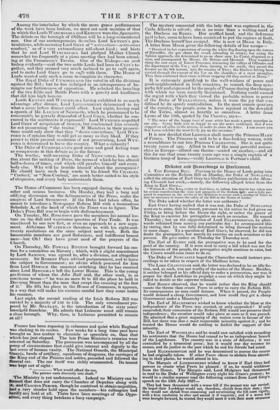The House of Commons has been engaged during the week
in sober and serious business. On Monday, they had a long and edifying discussion on the delinquencies of the Press, under the auspices of Lord STORMONT. If the Duke had taken office, lie meant to introduce a Newspaper Reform Bill with a tremendous Schedule A, at the head of which the Times was to figure. The Duke's Press Bill was to begin with disfranchisement.
On Tuesday, Mr. ROBINSON gave the members his annual lec- ture on the dull and wearisome question of Free Trade. It was unrelieved by one new fact, or even an approach to a new argu- ment. Alderman WAITHMAN threatens us with his eight-and- twenty resolutions on the same subject next week. Both the honourable members are good Reformers, and indifferent honest men—but Oh ! they have great need of the prayers of the Church.
On Thursday, Mr. FOWELL BUXTON brought forward his mo- tion for a committee on Slavery ; which, with a slight amendment by Lord SANDON, was agreed to, after a division, not altogether necessary. Sir ROBERT PEEL advised postponement, and to leave the subject to Government ; an advice which procured for him from Lord Howicic the smartest switching that he has received since Lord BROUGHAM left the Lower House. This is the young gentleman of whom the John Bull said, the other week, in so courteous terms—" he was no more fit to fill the place he held in Downing Street than the man that swept the crossing at the foot of it." He fills his place in the House of Commons, it appears, in a way that will make his enemies careful how they come under his censure.
Last night, the second reading of the Irish Reform Bill was carried by a majority- of 246 to 130. The only amendment pro- posed by Mr. STANLEY, is the introduction of the sixty years' leasehold franchise. He admits that Lisburne must still remain a close borough. Why, then, is Lisburne permitted to remain at all?


























 Previous page
Previous page